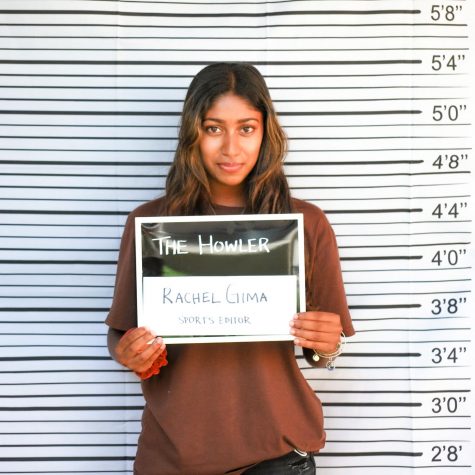Challenging beauty standards
November 15, 2020
The beauty standards ingrained into our society have produced a host of harmful stigmas that take a toll on the mental health of many individuals. Although these standards set by society are often unattainable, the pressure to maintain society’s narrow-minded perception of an “ideal body type” is enforced through the media and influential individuals.
Both men and women in a wide range of ages are negatively impacted by these standards and often attempt to change their physical appearance by using plastic surgery and following unhealthy diet trends that severely restrict proper nutrients from being absorbed. Although completely eliminating these standards is unrealistic, there are many ways to mitigate the detrimental impacts of beauty expectations.
When people think about beauty standards, the first picture that comes to mind is usually a woman suffering from an eating disorder or feeling pressured by the body types in magazines. However, unbeknownst to many, men also deal with the pressure of these standards as well as the misconceptions that beauty standards are only relevant for women.
According to the National Eating Disorders Association (NEDA), most males want to be muscular and are dissatisfied with their body type. The study showed that “25% of normal-weight males perceive themselves to be underweight and 90% of teenage boys exercised with the goal of bulking up.”
This type of body shaming and the continuous cycles of self-deprecation and criticism has led to many men developing muscle dysmorphia, a subtype of body dysmorphic disorder where “individuals obsess about being adequately muscular [and have] compulsions [such as] … spending many hours in the gym, squandering excessive amounts of money on supplements, abnormal eating patterns or use of steroids.”
Some invest money into makeup and other cosmetic products to improve their physical appearance. According to Forbes, out of the 3,000 women between the age of 16 and 75 in the United States, the average woman spends $8 on their face everyday and over 70% of participants stated this is because of the extra beautifying steps they added to improve their skin. Society has stigmatized a variety of naturally occurring blemishes, including dark circles, acne and wrinkles, causing people to go out of their way to cover them up because they are self-conscious about their visibility.
Not all efforts of changing one’s body are harmful. Feeling motivated to exercise can be a healthy attitude and applying make-up can be a form of self-expression. But being fixated on the need to look a certain way can be dangerous, as people constantly pick apart their physical flaws in attempts to meet impossible standards set forth by the media.
Extreme pressures to meet beauty standards can lead to eating disorders such as anorexia nervosa and bulimia nervosa, a consequence that shouldn’t be taken lightly. Based on the National Association of Anorexia Nervosa and Associated Disorders, “at least 30 million people of all ages and genders suffer from an eating disorder in the U.S. and every 62 minutes at least one person dies as a direct result from an eating disorder.”
Others have turned to cosmetic plastic surgery in recent years to boost confidence about their appearance. In just 2018, the American Society of Plastic Surgeons reported that more than $16.5 billion were spent on cosmetic procedures. A recent increase in plastic surgery has also been observed by doctors ever since the beginning of COVID-19.
At the end of the day, choosing to receive plastic surgery is an individual choice. However, there should be efforts made in preventing society from enforcing these standards upon people, especially when directed at younger children. This includes influencers, who should not be promoting any surgical procedure that changes one’s physical appearance. According to BBC, a study conducted by the Nuffield Council on Bioethics showed that there was a connection between pressure from the media and the rise in cosmetic procedures.
“We’ve been shocked by some of the evidence we’ve seen, including make-over apps and cosmetic surgery ‘games’ that target girls as young as nine,” University of Manchester Professor Jeanette Edwards said. “There is a daily bombardment from advertising and through social media channels like Facebook, Instagram and Snapchat that relentlessly promote unrealistic and often discriminatory messages on how people…’should’ look.”
Fad diet trends to “permanently” lose weight are also common amongst many. Celebrities with massive followings such as Kylie Jenner, Nicki Minaj and Cardi B. have endorsed weight loss items such as detox teas, contributing to unhealthy trends and eating habits that became nearly synonymous with diet culture. Although many of these fad diets with claims of instant results have been discredited by nutritionists and health officials, the industry still boasts success.
The success of the manufacturers and sellers, however, is dramatically outweighed by the detrimental effects experienced by consumers. These fad products are harmful to one’s physical health on top of all of the twisted mentalities they aim to invoke by inadvertently perpetuating the idea that any deviation from a certain body image is unattractive.
While these beauty standards cannot be completely eliminated, the mental and emotional tolls caused by them make it imperative that efforts are made to educate people about making correct decisions and create a safe environment for people to overcome both the internal and external pressure to conform to societal standards.
Some individuals have already begun calling out these beauty standards and standing up against them. Many celebrities such as Jameela Jamil and Lili Reinhart have stopped posting edited, idealized pictures of themselves and began calling out corporations that attempt to do it for them. There are groups of people that work to destigmatize scars and flaws through writing, photography, visual art and other forms of self-expression.
The body positivity movement is on the rise. As people continue to stand up for what is right, people across the world need to continue challenging societal standards, unlearn these harmful standards and redefine beauty as unaltered self expression.



![AAAAAND ANOTHER THING: [CENSORED] [REDACTED] [BABY SCREAMING] [SIRENS] [SILENCE].](https://thehowleronline.org/wp-content/uploads/2025/06/lucy-1200x800.jpg)

















































![AAAAAND ANOTHER THING: [CENSORED] [REDACTED] [BABY SCREAMING] [SIRENS] [SILENCE].](https://thehowleronline.org/wp-content/uploads/2025/06/lucy-300x200.jpg)



